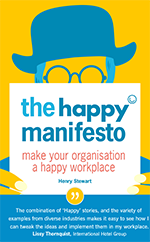The Public Sector is Well Run, but Government Procurement is Not
In my last blog I imagined what Tesco might be like if it was run by government procurement. Not as cheap as it is, was my main conclusion.
Hi, we are Happy
We are leading a movement to create happy, empowered and productive workplaces.
How can we help you and your people to find joy in at least 80% of your work?
However I was not arguing that the public sector is not as efficient as the private sector. My view is that much of the public sector is very well run. Like most people, I have had some very good experiences with the NHS, my children go to a great local school and my local council (Hackney), though once widely known for its incompetence and inefficiency, is now an example of well run services.
The figures released in the McNulty report on our rail industry backed this up. Operating costs (not prices but underlying costs) in the privatised British railways are 40% greater than the state-run services in France, Sweden and elsewhere. Remember that the very reason for privatising our rail industry was to make them more efficient. We all know that the service they provide us has not improved but it is interesting to discover that the whole exercise completely failed in terms of one of its main aims – creating a more efficiently run system.
There are some excellent private companies. But any of us who have ever phoned for help or support from the company who supplies our credit card, TV broadband or mobile phone is more likely to have been driven to distraction than delight. And that’s before we start talking about the performance of the financial services industry.
My flight to Denver – and how I got it far cheaper than a colleague from a multinational
My critique was not aimed at the public sector but at the branch of procurement that seeks to reduce costs through economies of scale and how this approach blights private companies as much as government. I first became aware of it around a decade ago when I flew to a conference in Denver with a colleague from one of the big four consultancies. He used the approved travel provider and, gaining the benefits of a company thought bought over £1 billion in flights a year, paid £1,100. I, booking my company’s first ever flight, paid £679.
His company had issued a big procurement and, as a result, employees were only allowed to fly with British Airways. This eliminated the forces of competition but instead enabled what they saw as the more powerful factor: economies of scale. You can imagine the process. They set down criteria such as “must be able to fly from UK direct to every major destination in the world”, making it impossible for most airline companies to bid and preventing employees from using lost cost airlines (such as Easyjet, then in its early days), even when they were far cheaper.
Using competition to reduce prices and using economies of scale are two very different approaches to procurement, and normally in contradiction with each other. More on this to come.
Keep informed about happy workplaces
Sign up to Henry's monthly Happy Manifesto newsletter, full of tips and inspiration to help you to create a happy, engaged workplace.

Learn the 10 core principles to create a happy and productive workplace in Henry Stewart's book, The Happy Manifesto.
Henry's Most Popular Blogs
- 8 Companies That Celebrate Mistakes
- 9 Benefits of Having Happy Employees
- 321Zero: How I Solved my Email Overload
- 16 Companies That Don't Have Managers
- 5 Big Companies Who Swear by Mindfulness
- 49 Steps to a Happy Workplace
- A Four Day Week? Let's Start With a Four Day August
- Google: Hire Great People and Give Them Lots of Autonomy
- Buurtzorg: No Managers, Just Great Care From a Nurse-Led Service
- 30 Steps to Joy at Work: Get More Done by Being Less Busy

Henry Stewart, Founder and Chief Happiness Officer
Henry is founder and Chief Happiness Officer of Happy Ltd, originally set up as Happy Computers in 1987. Inspired by Ricardo Semler’s book Maverick, he has built a company which has won multiple awards for some of the best customer service in the country and being one of the UK’s best places to work.
Henry was listed in the Guru Radar of the Thinkers 50 list of the most influential management thinkers in the world. "He is one of the thinkers who we believe will shape the future of business," explained list compiler Stuart Crainer.
His first book, Relax, was published in 2009. His second book, the Happy Manifesto, was published in 2013 and was short-listed for Business Book of the Year.
You can find Henry on LinkedIn and follow @happyhenry on Twitter.